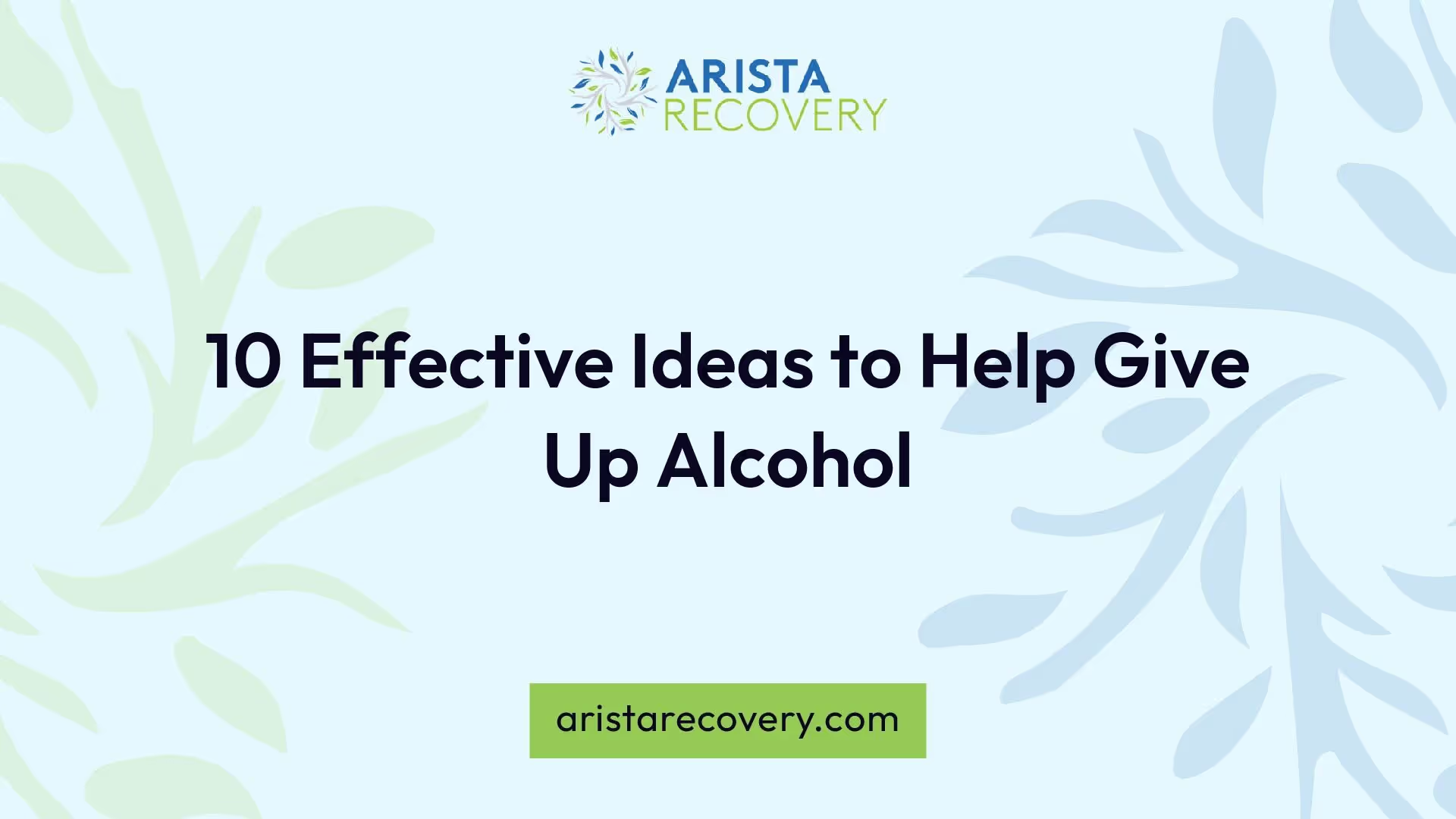
10 Effective Ideas to Help Give Up Alcohol
Understanding Alcohol Addiction
Alcohol addiction, also referred to as alcohol use disorder, affects countless individuals and has far-reaching implications for society. Understanding its impact on both personal and societal levels is essential for comprehending the urgency of addressing this issue.

Impact on Individuals
For individuals, struggling with alcohol addiction can lead to significant physical, mental, and emotional consequences. These may include:
- Health Problems: Long-term alcohol misuse can cause liver damage, cardiovascular issues, and neurological impairments. Alcohol consumption during pregnancy can have detrimental effects on fetal development [1].
- Mental Health Issues: Alcohol addiction is often linked to depression, anxiety, and other psychological disorders.
- Social Consequences: Relationships with family and friends may suffer. A person’s ability to maintain employment can be severely impacted by their dependency on alcohol.
The following table summarizes some common challenges faced by individuals with alcohol addiction:
Impact on Society
At a societal level, alcohol addiction poses significant costs and challenges. In the United States, alcohol misuse leads to:
- Alcohol-Related Deaths: A substantial number of lives are lost each year due to alcohol-related incidents. In 2019 alone, there were 298,000 deaths resulting from alcohol-related road crashes, with 156,000 caused by someone else's drinking [2].
- Healthcare Costs: The financial burden on medical facilities due to treating alcohol-related conditions is immense, creating challenges for healthcare systems [1].
- Emergency Visits: Many emergency room visits are attributed to alcohol-related incidents, highlighting the urgent need for effective interventions.
The example below illustrates some statistics regarding the societal impact of alcohol misuse:
Addressing alcohol addiction requires comprehensive strategies that involve seeking help, raising awareness, and providing support to affected individuals. For more insights, refer to five ways support loved one through treatment and the importance of community involvement in tackling this pervasive issue.
Seeking Help for Alcohol Addiction
Addressing alcohol addiction requires understanding available options and the importance of support systems. Various treatment modalities and support groups can significantly enhance the chances of successful recovery.
Treatment Options
Several effective treatment approaches exist for alcohol addiction. These options typically involve behavioral therapies and medications designed to assist individuals in changing their drinking habits.
These treatment options can be tailored to individual needs, promoting a comprehensive approach to sobriety.
Importance of Support Groups
Support groups play a vital role in recovery from alcohol addiction. They provide a safe space for individuals to share experiences and receive encouragement from others facing similar challenges. Mutual-support groups like Alcoholics Anonymous (AA) are particularly beneficial, offering peer support that can reinforce motivation and accountability. These groups complement the professional treatment led by healthcare providers, enhancing overall recovery efforts.
Engaging in support groups can lead to numerous advantages:
For individuals aiming to find effective strategies for sobriety, combining treatment options with active participation in support groups is crucial. This dual approach can significantly improve long-term chances of overcoming addiction. For more insights on supporting loved ones through treatment, refer to our guide on five ways support loved one through treatment.
Coping Strategies for Alcohol Cravings
Dealing with cravings while seeking sobriety is a common challenge for those looking to give up alcohol. Understanding how to cope with these urges is crucial for a successful recovery. Below, we discuss two effective strategies: identifying triggers and incorporating a balanced diet.
Identifying Triggers
Identifying triggers is essential for managing alcohol cravings. Triggers can be different for everyone and may include stress, certain social situations, or even specific foods. By recognizing these triggers, individuals can develop a plan to avoid or cope with them.
Understanding these triggers helps individuals create coping strategies tailored to their specific circumstances. For instance, practicing mindfulness techniques ways to be supportive of recovery can provide alternative methods for dealing with stress.
Incorporating a Balanced Diet
Another vital coping strategy for reducing cravings is incorporating a balanced diet. Alcohol cravings can stem from complex biological processes in the brain, including the alteration of certain chemicals like dopamine, which regulate pleasure and reward. A nutritious diet can help support brain chemistry and reduce cravings.
Foods rich in specific nutrients have been found to be beneficial in this regard. For example:
- Vitamin B6: Lower levels of vitamin B6 have been linked to increased alcohol cravings. Foods such as bananas, avocados, and chickpeas are good sources of this vitamin and can help support brain function.
- Omega-3 Fatty Acids: Found in salmon, walnuts, and flaxseeds, omega-3 fatty acids support brain health and reduce inflammation, making it easier to resist the urge to drink [4].
Incorporating a variety of these foods into daily meals can create a more balanced nutrient intake, ultimately aiding recovery efforts. Combining dietary changes with identifying triggers can greatly enhance one’s ability to cope with alcohol cravings and contribute to a healthier lifestyle. For additional insights on recovery, consider exploring five ways support loved one through treatment.
Health Impacts of Alcohol Misuse
Understanding the health impacts of alcohol misuse is essential for recognizing the dangers associated with excessive consumption. Misuse can have far-reaching effects, particularly on the brain and the body.
Effects on Brain
Alcohol contributes to significant chemical imbalances in specific neurocircuits of the brain. Chronic heavy drinking can be neurotoxic, resulting in damage to areas responsible for memory, decision-making, impulse control, and other cognitive functions. This is particularly concerning as alcohol can disrupt critical brain development patterns in adolescents, leading to a decrease in frontal cortical gray matter volume [5].
Evidence-based treatments can aid recovery from alcohol-induced changes, promoting healing in brain functionality [5]. Furthermore, brain plasticity can be utilized to foster healthy behaviors that support recovery from alcohol use disorder (AUD).
Effects on Body
The physical health consequences of alcohol misuse are also significant. Chronic consumption has been associated with various medical conditions that can affect nearly all organ systems in the body. The misuse can weaken the immune system, making individuals more susceptible to infections. Additionally, alcohol can cause liver damage, cardiovascular issues, and increase the risk of various cancers.
Studies show that individuals with nutrient deficiencies, especially vitamin B6, may experience more intense alcohol cravings. Incorporating foods rich in vitamin B6, such as bananas, avocados, and chickpeas, can support brain chemistry and reduce cravings [4].
Awareness and understanding of these health impacts are vital steps toward seeking help and implementing effective strategies in overcoming alcohol addiction. For more insights on supporting recovery, consider reading about ways to be supportive of recovery.
Prevalence of Alcohol Use Disorder
Statistics and Facts
Alcohol use disorder (AUD) is a substantial public health concern. According to the 2021 National Survey on Drug Use and Health, about 29.5 million people aged 12 and older in the United States, representing 10.6% of this age group, had an alcohol use disorder in the past year. Additionally, 47.5% of individuals in this same demographic reported consuming alcohol in the last month.
The following table illustrates key statistics related to alcohol use disorder:
In 2020, the SAMHSA National Helpline received 833,598 calls, reflecting a 27% increase from the previous year [7]. These numbers indicate a growing need for support and resources for individuals struggling with alcohol addiction.
Global Impact
Globally, the effects of alcohol consumption are profound. The World Health Organization reported that in 2019, 2.6 million deaths were attributable to alcohol consumption, showcasing the severe health risks associated with excessive alcohol intake. The highest rates of alcohol-related deaths per 100,000 people were observed in the WHO European and African Regions.
Alcohol misuse not only impacts individuals but also places a significant burden on society. In the United States, alcohol contributes to numerous emergency room visits and alcohol-related deaths, resulting in substantial financial implications related to healthcare and lost productivity.
Understanding these statistics highlights the urgency of addressing alcohol use disorder, and the subsequent need for effective strategies and support systems. For further insights into supporting those struggling with addiction, refer to our article on five ways to support a loved one through treatment.
Overcoming Alcohol Addiction
Overcoming alcohol addiction involves a combination of personalized treatment plans and understanding the brain's capacity for recovery.
Personalized Treatment Plans
Individualized treatment strategies are essential for effectively addressing alcohol addiction. These plans may incorporate various elements, such as behavioral therapies and medications. Behavioral treatments focus on altering drinking behaviors through counseling and support, which studies have shown to be beneficial.
Medications like Naltrexone, Acamprosate, and Disulfiram are approved in the United States and can aid individuals in reducing their alcohol consumption or stopping altogether. When paired with professional treatment led by healthcare providers, mutual-support groups like Alcoholics Anonymous serve as a valuable resource for enhancing recovery [3].
Brain Plasticity and Recovery
Understanding brain plasticity is crucial for those recovering from alcohol addiction. The brain's ability to reorganize and adapt is significant in the recovery process. Abstaining from alcohol can lead to improvements in both physical and mental health. Research indicates that alcohol cessation can help diminish the risk of adverse effects on organs such as the heart, brain, liver, and pancreas.
Abstaining can also bolster mental health and potentially prevent the emergence of some mental health conditions, as alcohol misuse is twice as common among individuals with existing mental health issues [6].
Overcoming alcohol addiction not only depends on the individual’s determination but also on effective treatment plans tailored to their unique circumstances. Through support, behavioral changes, and addressing underlying mental health concerns, individuals can foster a path toward lasting sobriety. For a broader understanding of support systems, view our article on ways to be supportive of recovery.
References
[1]: https://www.niaaa.nih.gov/alcohols-effects-health/alcohol-topics/alcohol-facts-and-statistics
[2]: https://www.who.int/news-room/fact-sheets/detail/alcohol
[3]: https://www.niaaa.nih.gov/publications/brochures-and-fact-sheets/treatment-alcohol-problems-finding-and-getting-help
[4]: https://compassionbehavioralhealth.com/7-foods-that-can-help-stop-alcohol-cravings/
[5]: https://www.niaaa.nih.gov/health-professionals-communities/core-resource-on-alcohol/neuroscience-brain-addiction-and-recovery
[6]: https://americanaddictioncenters.org/alcohol/why-hard-to-quit
When mental health challenges and addiction intersect, it can feel isolating. At Arista, we offer compassionate, evidence-based, and trauma-informed care to help you heal, grow, and move forward.
You’re not alone in this.
When mental health challenges and addiction intersect, it can feel isolating. At Arista, we offer compassionate, evidence-based, and trauma-informed care to help you heal, grow, and move forward.
Support that moves with you.
You’ve taken a brave first step. At Arista Recovery, we’re here to help you continue with best-in-class care designed for long-term healing and support.
.webp)






